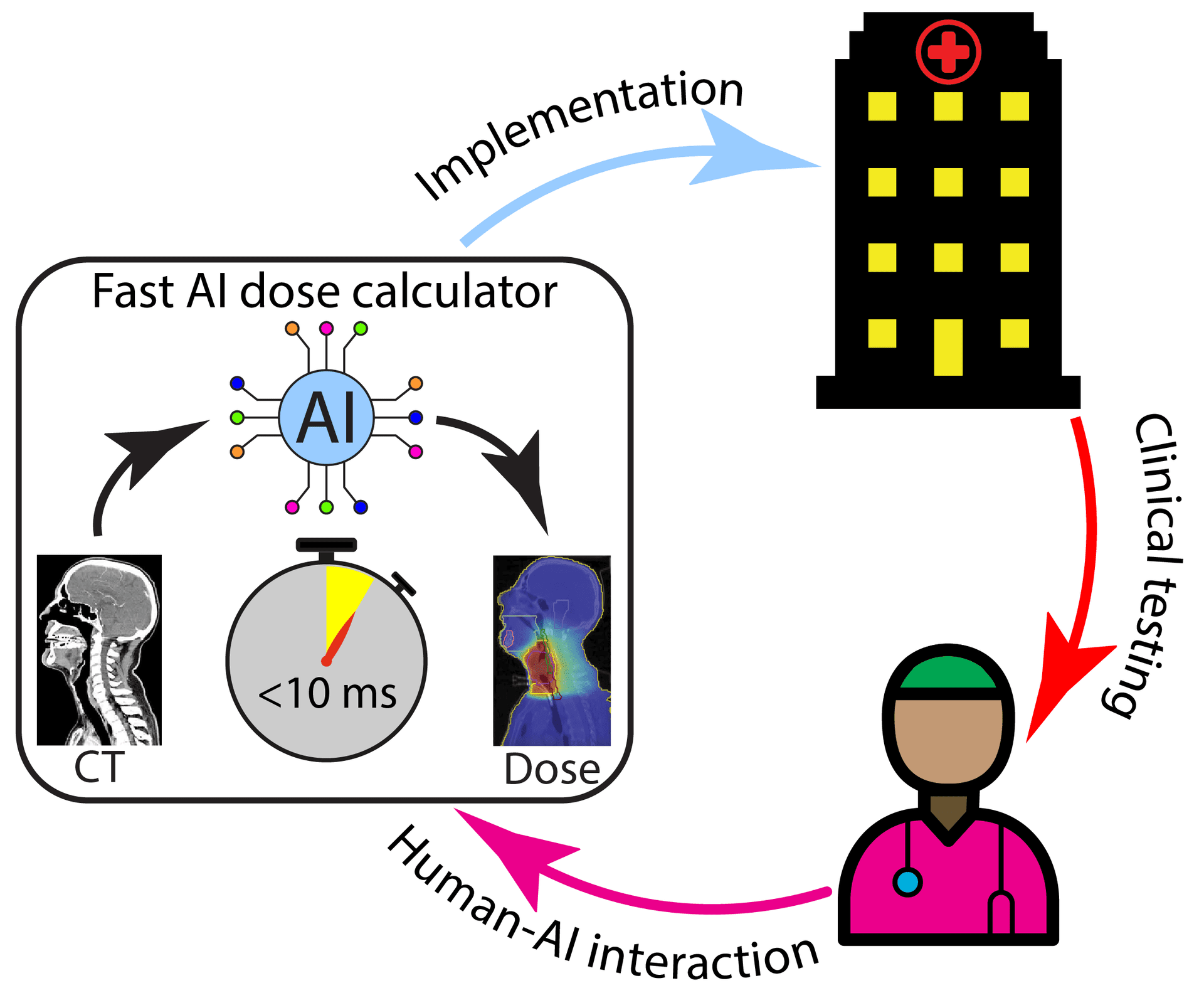From deep learning research to clinical impact

TU Delft and HollandPTC join forces to improve cancer treatments
How metamodeling and deep learning could overcome slow dose calculations in the clinic: An interesting collaboration between the Digital Competence Centre, the Radiation Science and Technology (RST) department of TU Delft and HollandPTC.
Proton therapy is very precise, but we need to make sure that we treat the right target area. This area however tends to change during the course of the treatment, as tumours may change in size, organs can move, or patients might lose weight. These are just a few examples of the uncertainties that must be taken into account while making a proton plan, and to accurately evaluate how our final plans handle all these inaccuracies we need many – tens, hundreds, or even thousands of – repeated dose calculations.
In the ideal world, we would perform such accurate proton plan quality evaluation daily. Unfortunately however, current dose calculation methods have been too slow for this. Until now. The researchers led by dr. Zoltán Perkó and dr. Danny Lathouwers at the Radiation Science and Technology (RST) department of TU Delft recently developed 2 algorithmic solutions to overcome the computational challenge of repeated dose calculations: a fast metamodeling approach and a deep learning model.
Cutting-edge care via Intensity Modulated Proton Therapy
Since 2018 the Holland Proton Therapy Center (HollandPTC) in Delft has been providing cutting-edge care for cancer patients via Intensity Modulated Proton Therapy treatments, representing the current state-of-the-art in radiotherapy. Due to the Bragg peak, proton therapy can better focus dose on the tumor than traditional radiotherapy, therefore can better preserve healthy tissues and decrease negative side effects. This more accurate targeting ability however also makes proton treatments more sensitive to uncertainties in patient positioning, proton range or organ motion. To ensure treatment efficacy, the robustness of proton plans must be thoroughly evaluated, requiring repeated dose calculations in the many – preferably thousands of – different uncertainty scenarios. The slow speed of currently available dose calculation methods however makes such extensive computations infeasible in most proton clinics on a routine basis.
Algorithmic solution to increase speed
Using the latest advances in computational science and artificial intelligence, the researchers led by dr. Zoltán Perkó and dr. Danny Lathouwers at the Radiation Science and Technology (RST) department of TU Delft have recently developed 2 algorithmic solutions to overcome this computational challenge: a fast metamodeling approach and a deep learning model. The results from thorough verification and testing of the 2 corresponding open-sourced software packages – performed by PhD students Oscar Pastor-Serrano from TU Delft and Jesus Rojo Santiago from Erasmus MC, and published in peer-reviewed literature [1,2] – have shown great potential to improve robustness evaluation and ultimately treatment plan quality too. However, to turn potential into real-life impact, these algorithms need to be clinically implemented and integrated with existing systems, allowing the further tests that are necessary before actual clinical use.
The goal: automated solution for fast dose calculation in a clinical environment
To take this step, the Digital Competence Centre of TU Delft (DCC) will join forces with HollandPTC and the RST department in a year-long collaborative project. During this time, Research Software Engineers from the DCC (Maurits Kok and Manuel Garcia Alvarez) will provide vital software development and implementation support, and work together with the TU Delft researchers and HollandPTC IT experts and medical physicists (dr. Mischa Hoogeman and dr. Steven Habraken), towards the clinical implementation of the TU Delft developed algorithms. By co-developing the necessary software improvements, adaptations, documentation, and integrated testing and quality assurance framework, the project aims to deliver a reliable, streamlined, and automated solution for fast dose calculation in a clinical environment, satisfying the clinical requirements and enabling medical professionals to further research and improve robustness evaluation.
By the end of the one year collaboration, we expect to deliver two well-documented, tested and versatile software packages, that could seamlessly be coupled to current clinical treatment planning systems to dramatically speed up dose calculation times. By adhering to open-source software principles, the project will not only benefit HollandPTC, but potentially many proton clinics around the world, allowing direct utilization of the final codes both for research and as consultative clinical tools. This could yield more accurate robustness evaluations and allow decreasing the current overconservativeness of clinical proton treatments, ultimately leading to better patient outcomes.

Clockwise from top left: Danny Lathouwers, Zoltán Perkó, Maurits Kok, Jesus Rojo Santiago, Oscar Pastor-Serrano and Manuel Garcia Alvarez
References:
- [1] Z. Perkó, et al. “Fast and accurate sensitivity analysis of IMPT treatment plans using Polynomial Chaos Expansion”, Physics in Medicine & Biology 61 (12), 4646, 2016.
- [2] O. Pastor-Serrano and Z. Perkó. “Millisecond speed deep learning based proton dose calculation with Monte Carlo accuracy”, Physics in Medicine & Biology 67 (10), 105006, 2022.
